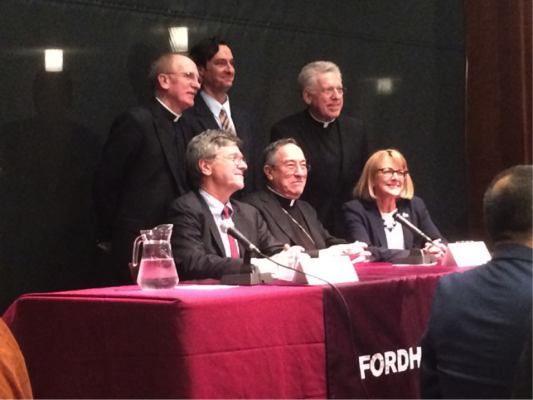Forum Discusses Climate Change and Faith
Left to right Father McShane, James McCartin and Monsignor Quinn, vice president of Campus Ministry, pose for a picture. Positioned front row, left to right are Sachs, Cardnial Rodriguez and Rosenhaur. (CECILE NEIDIG/THE OBSERVER)
November 12, 2015
On Tuesday Nov. 3, 2015, Fordham University’s Center on Religion and Culture (CRC) presented a panel in the 12th floor lounge of the Lincoln Center campus, co-sponsored by GreenFaith: Interfaith Partners for the Environment, that discussed environmental degradation and climate change in relation to faith and Pope Francis’ recent encyclical, “Laudato Si.” Discussing the encyclical and the necessary responses to climate change were Cardinal Óscar Rodriguez Maradiaga SDB; archbishop of Tegucigalpa, Honduras, president of the Episcopal Conference of Honduras and chairman of the Council of Cardinals (a group of eight advisors to the Pope); and Jeffrey Sachs; director of the Earth Institute and professor at Columbia University, and special advisor to the United Nations secretary-general; on millennium development goals.
James McCartin, associate professor of theology and director of CRC at Fordham, introduced the moderator, Joan Rosenhaur, the executive vice president of Catholic Relief Services and former associate director of the Department of Justice, Peace and Human development. McCartin briefly noted the relevance of the panel in light of the pope’s recent encyclical: “Among the many important interventions that the Pope made with his encyclical, it seems to me perhaps the most important is that he stirred in the minds of ordinary people a sense of connection between the themes of human poverty and environmental destruction.” McCartin noted that the encyclical paralleled the idea that “Our attention is turning from the environment as an abstraction to the environment as deeply connected to the dignity and sanctity of the human person. Especially of those persons whose dignity, whose health and whose safety are daily imperiled by the circumstances of dire poverty.”
Rodriguez spoke on the intentions of the pope in writing this encyclical, “The pope in his encyclical says there is not only an economic debt, but there is an ecological debt that cannot be on the shoulders of the poorest of the poor.” He spoke on the responsibility of all to take care of the earth because it is a common, shared space among all humans. “This is not only a problem of entrepreneurs or people of the economy or governments, it takes every single one of us. Nobody can say this doesn’t touch me because we are all involved; we live here.” In writing this encyclical, the pope wanted to enter into a dialogue with all to address these issues.“He is extending bridges of dialogue,” said Rodriguez.
To signify the lasting distress that climate change and environmental degradation has on our planet for future generations, Rodriguez urged everyone to consider what is awaiting the next generation. “What will we inherit to the next generations,” he posed to the audience, “a garden or a desert?”
Sachs suggested that the solutions and the necessary responses to issues of climate change are rooted in morality. “It is through the moral insight that great breakthroughs have come,” he said. “International statecraft, geopolitics, power relations, have to be within a moral framework.” Recognizing the commonality between all humans is something that he notes as vital when considering climate change.
When commenting on the validity of climate change, Sachs asserted that it is evidenced in both scientific fact and the human experience-that we can see humans that are actually faced with the damaging effects of climate change. “There is no real scientific debate, but we have confabulated a political debate in this country,” Sachs said. “This is a reflection of our money politics beyond anything else.” The money politics being that “the biggest damage in the world is occurring to the poorest people.” Unjust economic policies affect not only the finances of the poor, but also affect their proximity to the dangers that climate change causes.
Rosenhaur, to close the discussion, asked the panel for the most important piece of information that the audience could take away with them about what the pope’s encyclical calls them to do and what the reality of climate change calls them to do. Sachs encouraged all to combat the “globalization of indifference,” and that “the ultimate choice is the moral choice.” Rodriguez urged the study and reading of the encyclical to put it in practice and spread the knowledge.
In attendance of this event was the president of Fordham University, the Rev. Joseph M. McShane, S.J. He closed the evening by commenting on the sizeable audience and how this correlated to the interest in the encyclical. He was appreciative of the panelists and moderator for “reminding us that our work is just beginning.”










